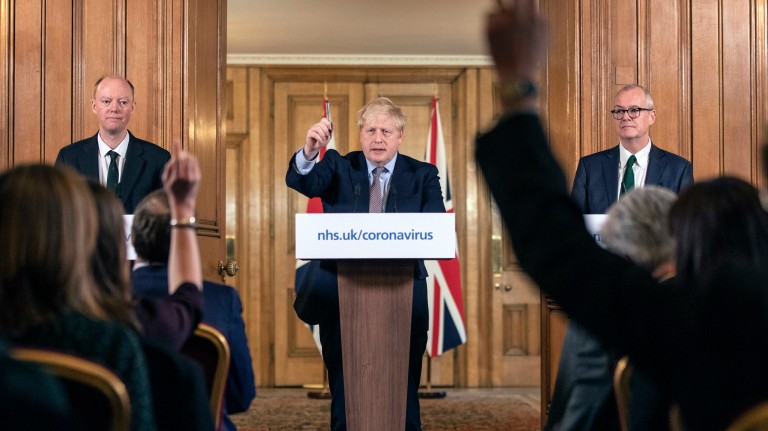A new report issued by a group of experts advising the UK government offers a blistering assessment of the country’s previous “herd immunity” approach to coronavirus, suggesting that as many as 250,000 people could die as a result—and that it would do little to stop health-care facilities from being overwhelmed.
The background: Last week, Prime Minister Boris Johnson announced that his country would adopt a different coronavirus strategy from the ones its European neighbors have followed. Most governments have sought to suppress the spread of the virus by reducing mass gatherings, imposing quarantine restrictions, and encouraging social distancing. But Johnson said the country would forgo such measures with an unusual plan to prevent the outbreak from overwhelming the health-care system and protect the most vulnerable groups during peak infection seasons. Under the strategy, at least 60% of the population were expected to contract the virus and get better—mostly younger individuals who would face only a mild form of illness. The government believed this would result in a “herd immunity” that would subsequently protect vulnerable groups from infection, while avoiding “behavioral fatigue” that would cause people to stop cooperating with safety measures over time.
Sharp realizations: That strategy was met with fierce criticism over the weekend. The Covid-19 Response Team based at Imperial College in London revealed on Monday that the government’s experts realized only over the last few days that its policy would “likely result in hundreds of thousands of deaths”—potentially 250,000—and that the burden on health systems would exceed their capacities and resources by as much as eight times.
"We were expecting herd immunity to build,” Azra Ghani, head of infectious disease epidemiology at Imperial College, told reporters Monday. “We now realize it’s not possible to cope with that.” Instead, the report advocates suppressing the virus with aggressive measures that would keep case numbers consistently low, in line with what many other countries are doing.
Correcting the ship: The UK government seems to have realized its errors and is now scrambling to to do better. On Monday, Johnson asked people to avoid “non-essential contact” and refrain from going to crowded spaces and venues. A ban on mass gatherings starts Tuesday. Families were urged to stay home for 14 days should any members exhibit symptoms, not going out “even to buy food or essentials.”
“The aim now is not to slow the rate of growth of cases, but pull the epidemic in reverse,” Neil Ferguson, an epidemiologist at Imperial College, told reporters Monday. “Hopefully there will [only] be tens of thousands of deaths. Maybe just a few thousand.”
Unfortunately, the report also suggests that isolation and social distancing might have to remain in effect until a viable coronavirus vaccine is produced, which could take as long as 18 months. “The only exit strategy is really vaccination or other forms of innovative technology,” Ferguson.
This story is part of our ongoing coverage of the coronavirus/Covid-19 outbreak. You can also sign up to our dedicated newsletter.

